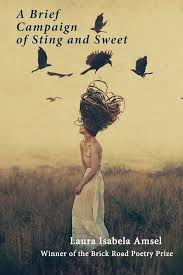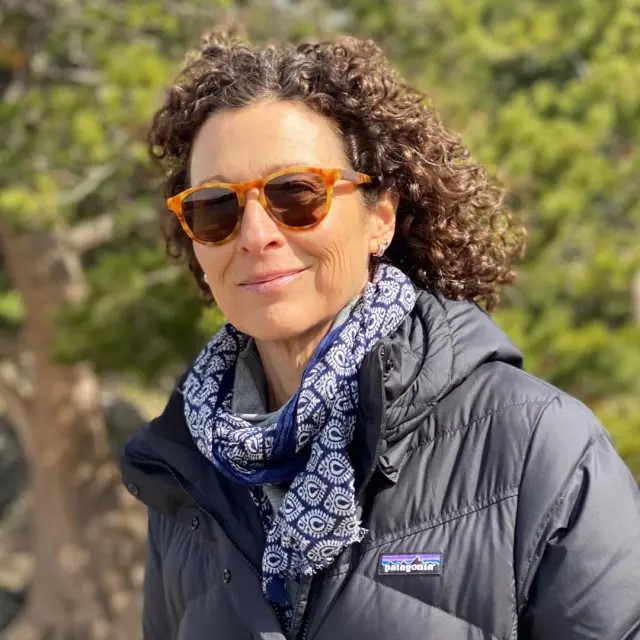
A Brief Campaign of Sting and Sweet
ISBN: 978-1950739134
2024 Brick Road Poetry Press
$17.95, 110 pages, paper
Reviewed by Dave Seter
Childhood can be a time of intense joy and disappointment. An old idiom counsels: children should be seen and not heard. In her poem “Father,” Laura Isabela Amsel writes: “Your stethoscope never did listen / to me” (p. 4). But there’s no containing a voice forever, Amsel proves in her debut collection, A Brief Campaign of Sting and Sweet. These vivid and incantatory poems demand to be seen and heard.
Amsel offers: “The best poems are ones the poet cannot quite control, the ones that insist on becoming themselves.” We see this idea play out in a childhood memory in “Listening for Something as a Girl, 1910” (p. 6):
My vigilance is visceral;
there is no freeze in me.
I am all ear-swivel
and twitch, amygdala
and head hitch, tail
switch and quick shit,
adrenaline and flinch.
The child seems destined to become the poet, alert to her surroundings. The intensity of life surfaces in subjects of family, childhood, marriage, motherhood, cancer, and divorce. The danger of a child’s overdose plays out in “For All Her Questions” (p. 11):
Had she run away two days or was it five?
A handful of pills or a bottle entire?
Did the boy, panicking, forsake her in the grass,
with squealing tires his hasty leave?
In keeping with the title of the collection, we also find what is sweet, in the joy of two sisters in “Brushy Creek” (p. 18):
With horses, unsaddled, in halters,
we’d start from the sandbar,
ask for a gallop, urge them
into the water.
They’d canter in.
The footing was loose;
they’d stagger on.
But we knew the truth:
those horses flew.
Cimmie and Harley grew wings,
and we were Brushy Creek
goddesses, queens in command…
Sense of place is strong in these poems. They are populated with the inhabitants of Mississippi, including animals such as small, alligator-like, caiman (who are fed salamanders by the father, salamanders collected by the child), birds such as screech owls (from which the father “steals nicker and trill”), various trees (mockernut, sugar maple, pawpaw, red oak) and their lichen (“verdigris-green and leathery-white”).
The poet and her children lend a personal touch to landscape when, in “Naming Moons,” they select names based on local, highly personal, encounters with wildlife, including Coyote Moon, Daffodil, Worms Returning, and so on. In addition to family life, we find occasions of personal sting that must be borne alone, or at least within one’s own body; namely that of cancer, whose possible causes are described in these lines from “Irretrievable” (p. 44):
The FDA, glyphosate, the EPA, BPA
in plastics, asbestos, chasing, as a child, the mosquito
truck’s toxic fog, FD&C red dye forty, mercury fillings,
radioactive mammograms, hazy ultrasounds, every lazy
radiologist who ever missed a massive tumor—
lobular carcinoma likes to hide.
These poems are written with an open heart and with nothing to hide. They speak to the reader in tones of incantation and through the lens of an adult who can still see through the eyes of a child.
Published in Cider Press Review, Volume 26, Issue 2.
See all items about Dave Seter
Visit Dave Seter’s contributors page.
See all items about Laura Isabela Amsel
Visit Laura Isabela Amsel’s contributors page.


 Dave Seter is an ecopoet and the author of Don’t Sing to Me of Electric Fences, Cherry Grove Collections (2021). His poems and critical works have appeared in Appalachia, Cider Press Review, Confluence, The Hopper, Paterson Literary Review, Raven Chronicles, and other journals. He has received two Pushcart nominations. He earned his undergraduate degree in civil engineering from Princeton University and his graduate degree in humanities from Dominican University of California.
Dave Seter is an ecopoet and the author of Don’t Sing to Me of Electric Fences, Cherry Grove Collections (2021). His poems and critical works have appeared in Appalachia, Cider Press Review, Confluence, The Hopper, Paterson Literary Review, Raven Chronicles, and other journals. He has received two Pushcart nominations. He earned his undergraduate degree in civil engineering from Princeton University and his graduate degree in humanities from Dominican University of California.  Laura Isabela Amsel was born in the Mississippi Delta and now lives in Madison, Mississippi. She holds an MA in Spanish from Middlebury College. Her poems have appeared in numerous journals, including Terrain, Another Chicago Magazine, Cloudbank, Common Ground Review, wildness, Nimrod International Journal, Harbor Review, and Atlanta Review. Her poem “Father” won the 2022 Monica Taylor Poetry Prize, judged by Airini Beautrais, and her poem “Cain” won the 2022 Mikrokosmos Poetry Prize, judged by A.E. Stallings. A Brief Campaign of Sting and Sweet is her first book of poetry.
Laura Isabela Amsel was born in the Mississippi Delta and now lives in Madison, Mississippi. She holds an MA in Spanish from Middlebury College. Her poems have appeared in numerous journals, including Terrain, Another Chicago Magazine, Cloudbank, Common Ground Review, wildness, Nimrod International Journal, Harbor Review, and Atlanta Review. Her poem “Father” won the 2022 Monica Taylor Poetry Prize, judged by Airini Beautrais, and her poem “Cain” won the 2022 Mikrokosmos Poetry Prize, judged by A.E. Stallings. A Brief Campaign of Sting and Sweet is her first book of poetry.


